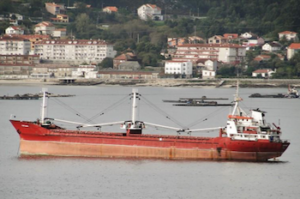The bulletin n°59 could only be special. Robin des Bois tracked derelict and slave ships that prowled the Mediterranean and Black Sea and slipped through the meshes of the surveillance nets. They should urgently be scrapped, but they continue against all odds carrying anything from hashish and explosives to live meat (p. 2-46). In some respects, they benefit by the collusion of the European Union since many of them have as classification societies opportunistic companies established in Greece and Cyprus and acting on behalf of safe and prestigious flags such as those of Togo and Moldavia.
 Lady Boss, November 2016. Cf. p. 6 © Victor H Lorenzo
Lady Boss, November 2016. Cf. p. 6 © Victor H Lorenzo
On pages 59 to 60, the bulletin n°59 explains how the Covid-19 pandemic caused the commercial ship scrapping market to shift from sluggishness to depression. Special mention goes to the leopard who applies the stay at home order in a French ex-tanker while enjoying the calm on the beaches of Alang. Thanks to this sympathetic feline, it was once again pointed out that French shipowners continue to take advantage of the bargain of scrap metal dealers in the Indian subcontinent who are the highest bidders for metal/tonne even when the metal is soiled by sludge and oil crusts.
“Shipbreaking” n°59 summarizes from pages 47 to 58 what was the market for the demolition of these vehicles, that account for 90% of the world’s trade (and waste?) before the Covid-19 breaker. On this occasion, the conflict of a cash buyer based in the Middle East with an American pension fund demonstrates once again that international finance is as transoceanic as ships and does not escape piracy as they do.
“Shipbreaking” n°59 (pdf 61 pages – 13.5 Mo)
 Imprimer cet article
Imprimer cet article









